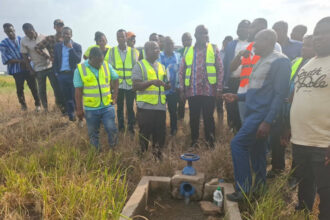Let’s start with hymn 2, 🎶 Revenue Assurance 🎶
Revenue assurance, contract is mine;
Oh, what a foretaste of kickbacks divine;
Heir of procurement, purchase of Fraud;
Signed without tender, nodded and flawed.
This is my story, this is my song;
Praising my sponsor all the day long;
This is my story, this is my song;
Praising my sponsor all the day long.
Please be seated!
It appears we are sleepwalking into yet another SML-style scandal, this time at the Ghana Airports Company Limited (GACL). A new “revenue assurance” deal is reportedly in the works, a copy & paste of what we saw at the Ghana Revenue Authority (GRA).
Once again, a state agency designs a revenue system that cannot collect what it earns, and instead of fixing the system, it hires a private company to chase the leakage in exchange for a fat commission on the “uncollected” revenue.
It’s like building a leaking tank, then hiring someone to mop the floor for 25% of the spillage.
I. The Pattern Is Alarming (and Familiar):
- GRA outsourced to SML.
- NPA handed fuel tracking to third-party firms.
- ECG, GACL, and others are exploring similar “assurance” arrangements.
- It’s always after the fact. Always expensive. Always opaque.
- We’ve turned “failure to collect revenue” into a thriving business model for the connected.II. Why This Must Stop1. It’s a Symptom of System Failure:
A properly designed revenue system should automatically collect what is earned. If you need to call in private bounty hunters, it means your system was never designed for control, verification, or accountability.
It’s like building a bank without locks and then outsourcing security to someone who is paid commision based on recovered stolen cash.
2. It Creates Perverse Incentives:
If a company earns 10–25% of “uncollected” revenue, then guess what? Their incentive is not to fix the leak. These “assurance firms” don’t solve revenue inefficiency; they feed on it.
Like bedbugs on an elephant, they thrive because the system is broken. Fix the system, and they vanish. Which means: they don’t want it fixed.
3. It’s a Legal and Ethical Quagmire:
These contracts often bypass:
• Competitive procurement rules.
• Parliamentary scrutiny.
• Oversight by the Auditor-General or Controller & Accountant-General.They’re usually shrouded in secrecy and conveniently awarded to politically connected entities.
You and I know that once they collect the loot, our loot recovery systems are not robust enough to recover them (Don’t even think about it —- Loot Assurance?)
4. It Breeds Laziness and Escapes Accountability:
Instead of disciplining staff and reforming systems, public officials point fingers at SML, Evatex, or some other firm. Then they return to sleep, confident that the mop man is coming, paid with public funds.
III. How to Build a Revenue System That Works
You don’t need a PhD in Revenue Collection. You need common sense:
1. End-to-End Digitization
All transactions — sales, taxes, fees — must be logged in real time, with audit trails and access controls.
2. Segregation of Duties
No one official should control collection, recording, and reporting. Break the chain of collusion.
3. Automated Reconciliation
Match cash received with services rendered and bank deposits — daily or weekly, not annually.
4. Embedded Internal Audit
An internal audit team should monitor transactions in real time, not 18 months later in a postmortem.
5. Public Oversight Dashboards
Let Parliament, civil society, and even the public see revenue trends in real time. Sunshine disinfects.
IV. Why This Is a Core Governance Crisis
- Revenue is sovereignty. If the state can’t collect its own earnings, it can’t fund schools, clinics, or roads.
- Every cedi lost to “revenue assurance” is a cedi stolen from development.
- This is not a tech problem — it’s a discipline problem. We don’t need more apps. We need more accountability.
V. Why People Must Be Fired
If you’re the Director of Revenue and your job is outsourced to a private firm, you’ve failed.
• Why should the taxpayer fund salaries, perks, and vehicles for officials who then subcontract their core responsibility?
• Why are the same people who designed these broken systems allowed to supervise the very contracts meant to fix them?
• Why do those who failed to fix revenue collection in public office retire only to return as “experts” with private revenue assurance contracts?
You couldn’t seal the leaks in office, but now you want a commission to mop the floor? This is not how a serious country works.
VI. Bottom Line: We Don’t Have a Revenue Assurance Problem. We Have a Revenue Amnesia Problem.
We’ve forgotten how institutions are supposed to work. No serious private company builds a leaky system and then hires someone else to plug it.
Yet that’s exactly what GACL, GRA, and others are doing. They’re building holes and renting buckets.
And now, bedbugs are drinking the elephant while the people sleep hungry.
Let’s fix the system. Not fund the failure.
If you can’t design a system to collect what’s due, step aside for someone who can. We deserve better than bounty-hunting contracts and boardroom excuses.
PS: Yɛde post no bɛto hɔ. Yɛnyɛ comprehension consultants.
Da Yie!














